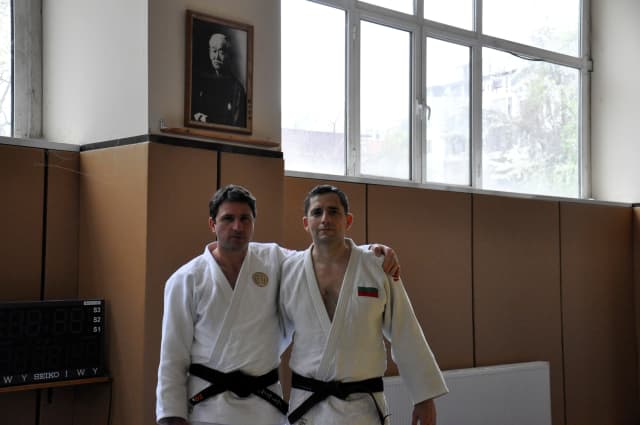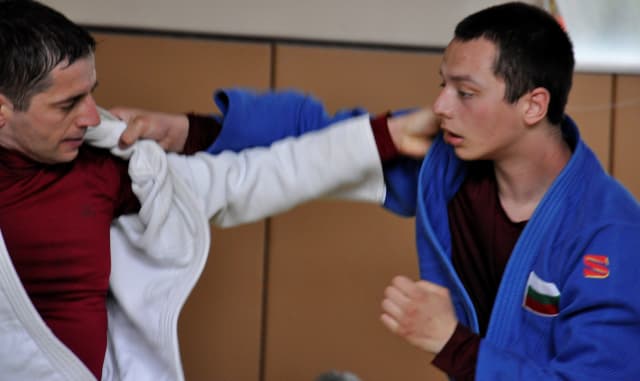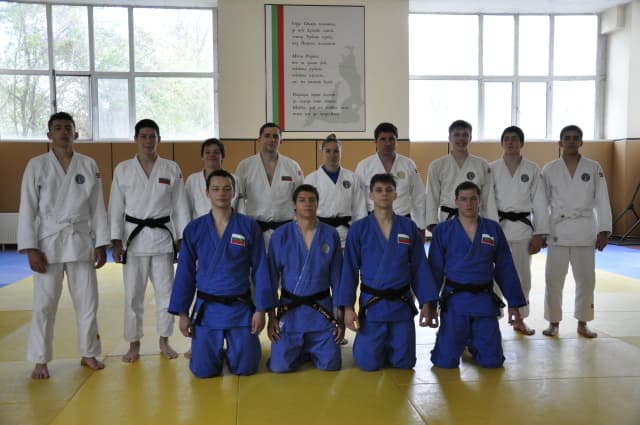Martin is a world leader in the field of artificial intelligence. He is less well known than a rock star, but more important if we adjust to scientific criteria, which is what we have come to look for. Martin is also a black belt in judo.
He lives in Switzerland, but practises judo in Bulgaria, his native country, where his sensei, Svilen Skerlev, resides. They are genius and teacher, both in their forties, that age when things are finally understood and neurons are consumed for good reason. Together they train, talk and develop ideas and projects. Thanks to Svilen, we've found Martin. Since we have him at hand, we take advantage of the occasion.
Who are you?
"I am Professor of Computer Science and Artificial Intelligence at ETH
Zurich, Switzerland and also the architect of INSAIT (www.insait.ai), the
new world-class research institute founded in Sofia, Bulgaria, spanning the
general areas of computer science, artificial intelligence and technology.
Furthermore, I am also a tech entrepreneur and I have co-founded three
successful deep-tech startups."
Tell us about that new AI project in Bulgaria
"INSAIT is a very exciting and disruptive project which aims to raise the
level of research done in eastern Europe, to that of western counterparts,
like top universities such as ETH Zurich, EPFL, Cambridge, Oxford and
others. It is the first institute of its kind in the region that is structured like modern world-class institutions and it offers competitive working conditions. INSAIT can help develop a more balanced research and innovation landscape in Europe, thus leading to a more balanced and strong Europe as a whole."
Why is it so important?
"It is important because until now, top talent always had to leave the
region to seek better opportunities elsewhere. For the first time, INSAIT
gives people hope that they can attain world-class results while being at home or close to it. Thus, INSAIT is a lot about giving hope and opportunity to talented people in a scientific area which is one of the most strategic right now: computer science and artificial intelligence. Of course, it goes without saying that advances in this space are instrumental in driving a stronger economy, thus INSAIT will have a positive economic effect as well."
What is your role in that programme?
"I am the architect of INSAIT and have been working on it very hard for 3
years. I am also the chair of its supervisory board and am responsible for the scientific development of the institute. I have wanted to create such a centre for the last 20 years, ever since I was a graduate student at Cambridge University."
Tell us about you as a judoka
"I have a black belt in judo and I consider myself a huge judo enthusiast. I
did compete a bit here and there, mostly to obtain my black belt, but nothing major. I have been doing judo for 20+ years and I follow the judo scene actively. I am familiar with many of the active judo players in all categories and I always try to watch the World Judo Tour events, the Europeans and world championships, but I also enjoy watching all levels, from children all the way to the Olympics. I have probably watched more international judo than many international coaches!
I very much love all aspects of judo and I am very interested in helping the sport grow. Also, both of my children, a boy and a girl, train in judo and compete. I think it is the most wonderful sport there is. If there is any event that would make me wake up at 3am to watch, it would be a judo event.”
Does judo and its values help you at work?
"My work intensity is very high and judo is really the only activity that I
do which can help me disconnect from my daily work. I have not found any
other sport that really allows me to balance out my inner being more than
judo. When someone is trying to throw you on your head, you must forget all
other concerns! So I find judo to be the sport with the highest return, in the sense that, you learn new things constantly, you get in shape and you also disconnect from daily work. Further, you meet many new friends all around the world.
I find many aspects of judo so incredibly useful for the real world. First, no matter who you are, you need to follow the rules and learn like everyone else. Second, you cannot buy progress, no matter who you are or how much money you have. Third, there is no illusion in judo; your technique and skills either work or they don’t, there is no place for believing in fake reality. All your beliefs will be tested and as they say, ‘the mat will show everything you have to say.’ Judo keeps you grounded and humbled and this is good for you. Fourth, there is respect for all of your training partners and coaches, where no matter how hard you train or complete, it is all left in the dojo. Fifth, judo is based on basic principles of physics, yet is so infinitely rich. It allows you to be creative and define new combinations and variants of techniques. It is structured, yet it is not rigid. You can study judo all your life and you can always learn more. Finally, judo is just plain hard! It is hard to do judo at 20% and I believe doing hard things is important for building character. So these
are all features of judo that will help you in your daily life outside judo, staying grounded to reality and controlling your emotions and feelings.
There are many more reasons to love judo, but certainly for me judo is
absolutely my favourite activity and I could spend hours and hours in the
dojo involved in all aspects of the sport. I think everyone should train judo and I am very interested in helping the sport grow as much as possible."
Who is your favourite judoka?
"I have many favourite judo players, there are so many amazing athletes and in different ways. I like the judo of Christa Deguchi, Jorge Fonseca, Tato
Grigalashvili, Inal Tasoev and many many more. Also, from the past, I like Travis Stevens and Flavio Canto. Of course, I am very interested in the success of all Bulgarian judoka as well as Toma Nikiforov but I have to
say my most favourite judoka is my coach Svilen Skerlev. He is a person whom has committed his life to judo and who serves as an example to others both in and out of the dojo. He is a fantastic coach but an even better person and judo needs more people like this."
Do you have any suggestions for how to make judo more popular?
"Yes, I am very excited about making judo more popular and accessible to all children and adults around the world. In fact, together with my coach Svilen Skerlev we have been working on a major project related to judo over the last few years, so expect some major news on this front as well."
To speak of or with Martin is to put a face and a name to the expression “mens sana in corpore sano”. From his words we deduce that judo is his favourite extra-curricular activity because it is a sport open to all, like science and the search for knowledge, but it has a higher level of demand, just like his job. The evidence required by science to prove a theory is the same as in judo. Results are obtained based on work, discipline and seriousness. Without effort there can be no progress, but without entertainment, without passion, there can be no enthusiasm and therefore no improvement. Actually, judo and science go hand in hand because excellence is the inherent factor that they share. If Martin is the vector between martial arts and science, then we can sleep easy because we are in good hands.



